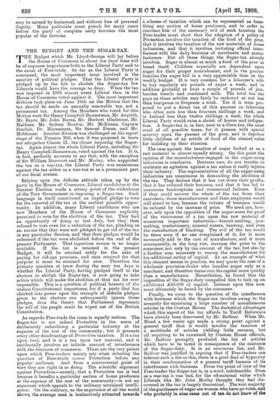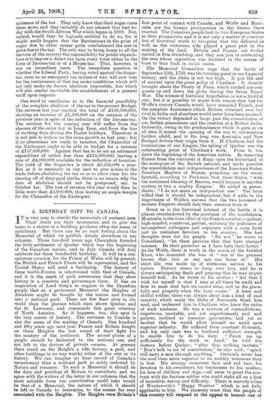THE BUDGET AND THE SUGAR - TAX. T HE Budget which Mr. Lloyd-George
will lay before the House of Commons in about ten days' time will be of supreme importance both to the Liberal Party and to the cause of Free-trade. So far as the Liberal Party is concerned, the most important issue involved is the sanctity of political pledges. That the Liberal Party is pledged up to the hilt to abolish the Sugar-tax few Liberals would have the courage to deny. When the tax was imposed in 1901 almost every Liberal then in the House of Commons voted against it. The most important division took place on June 18th on the Motion that the tax should be made an annually renewable tax, not a permanent tax. Among the Members who voted for this Motion were Sir Henry Campbell-Bannerman, Mr. Asquith, Mr. Bryce, Mr. John Burns, Mr. Herbert Gladstone, Mr. Haldane, Mr. Sydney Buxton, Mr. McKenna, Captain Sinclair, Dr. Macnamara, Sir Samuel Evans, and Mr. Hobhouse. Another division was challenged on the report stage of the Finance Bill, when it was proposed to leave out altogether Clause II., the clause imposing the Sugar- tax. Again almost the whole Liberal Party, including Sir Henry Campbell-Bannerman, voted against the tax. It is, in fact, perfectly accurate to say that, with the exception of Sir William Harcourt and Mr. Morley, who supported the tax as a war-tax, the Liberal Party was unanimous against the tax either as a war-tax or as a permanent part of our fiscal system.
Relying upon the definite attitude taken up by the party in the House of Commons, Liberal candidates at the General Election made a strong point of the wickedness of the Tory Government in imposing a Sugar-tax. Such language in itself constituted an implied pledge to vote for the removal of the tax at the earliest possible oppor- tunity. In addition, many Liberal candidates who are now Members of the House of Commons explicitly promised to vote for the abolition of the tax. They had an opportunity of doing so last July, but they then refused to vote even for a reduction of the tax, pleading as an excuse that they were not pledged to get rid of the tax in any particular Session, and that their pledges would be redeemed if the tax were abolished before the end of the present Parliament. That ingenious excuse is no longer available. If the tax is retained in the present Budget, it will be retained solely for the sake of paying for old-age pensions, and once retained for that purpose it must be retained for ever. Therefore the primary question at issue during the next ten days is whether the Liberal Party, having pledged itself to the electors to abolish the Sugar-tax, is now going to take action which will make the abolition of that tax for ever impossible. This is a question of political honesty of the utmost Constitutional importance, for if a party that has climbed into power upon the strength of definite pledges given to the electors can subsequently ignore those pledges, then the theory that Parliament represents the will of the people must be wiped out of the British Constitution.
As regards Free-trade the issue is equally serious. The Sugar-tax is not indeed Protective in the sense of deliberately subsidising a particular industry at the expense of the rest of the community ; but it presents every other disadvantage of Protective taxation. It is a tax upon food, and it is a tax upon raw material, and it incidentally involves an infinite amount of interference with the business of commerce. These are the very points upon which Free-traders mainly rely when debating the question of Free-trade versus Protection before any popular audience. And from a controversial point of view they are right in so doing. The scientific argument against Protection—namely, that a Protective tax is bad because it benefits a particular section of home producers at the expense of the rest of the community—is not an argument which appeals to the ordinary untrained intelli- gence. On the contrary, as the experience of all the world shows, the average man is instinctively attracted tews,rds a scheme of taxation which can be represented as bene- fiting any section of home producers, and in order to convince him of the necessary evil of such taxation the Free-trader must show that the adoption of a policy of Protection involves the taxation of the food of the poor, that it involves the taxation of the raw materials of home industries, and that it involves irritating official inter- ference with the daily business of merchants and manu- facturers. But all these things the Sugar-tax already involves. Sugar is almost as much a food of the poor as bread itself. Children especially are dependent upon sugar for their proper nourishment, and in the poorest families the sugar bill is a very appreciable item in the weekly budget. It is very common for a labourer's wife to buy regularly six pounds of sugar a week, and in addition probably at least a couple of pounds of jam, besides treacle and condensed milk. The total tax she pays on these articles may fairly be reckoned at not less than fourpence or fivepence a week. Yet if it were pro- posed to put a direct tax of this amount on labourers who often earn less than fourteen shillings a week, and in Ireland less than twelve shillings a week, the whole Liberal Party would raise a shriek of horror and indigna- tion. A Sugar-tax is, in fact, next to a Corn-tax, the most cruel of all possible taxes, for it presses with special severity upon the poorest of the poor, and it deprives little children of an article of food of the utmost value for building up their stamina.
The case against the taxation of sugar looked at as a raw material is almost equally strong. On this point the opinion of the manufacturers engaged in the sugar-using industries is conclusive. Business men do not trouble to maintain an agitation against a tax unless it really injures their industry. The representatives of all the sugar-using industries are unanimous in demanding the abolition of the tax. They declare that it has cut down their profits, that it has reduced their business, and that it has led to numerous bankruptcies and commercial failures. Even if they could recover the whole of the tax from their customers, these manufacturers and their employees would still stand to lose, because the volume of business would be reduced by the increase of price. We need not, how- ever, rely upon the opposition of the sugar-users for proof of the viciousness of a tax upon the raw material of numerous important industries,—biscuit-making, jam. making, confectionery, mineral waters, brewing, and even the manufacture of blacking. The evil of the tax would be there even if no one complained of it, for it must necessarily add to the cost of manufacture, and it must consequently, in the long run, increase the price to the consumer, not only by the amount of the tax, but also by a further sum necessary to recoup the manufacturer for his additional outlay of capital. As an example of what this element means in practice, we may quote the case of a wholesale provision-dealer who handles sugar only as a merchant, and therefore turns over his capital more quickly than a manufacturer. Nevertheless, he found that the imposition of the Sugar-duty compelled him to lock up an additional £40,000 of capital. Interest upon this sum must ultimately be found by the consumer.
Finally, we come to the question of the interference with business which the Sugar-tax involves owing to the necessity for examining a large number of miscellaneous articles in the Custom House. The dialectical advantages which this aspect of the tax affords to Tariff Reformers have already been discovered by Mr. Balfour. When Mr. Mond a few weeks ago made a strong point against a general tariff that it would involve the taxation of a multitude of articles yielding little revenue, but all requiring to be examined by Custom House officials, Mr. Balfour promptly produced the list of articles which have to be taxed in consequence of the existence of the Sugar-duty. It is an enormous list, and Mr. Balfour was justified in arguing that if Free-traders can tolerate such a list as this, there is a good deal of hypocrisy in their condemnation of a general tariff because of its interference with business. From the point of view of the Free-trader the Sugar-tax is, in a word, indefensible. Even as a war-tax it was bad, for the educational value which Liberals like Mr. John Morley thought they had dis- covered in the tax is largely theoretical. The vast majority of the purchasers of sugar are women who have no votes, and who probably in nine oases out of ten do mot knew of tbil existence of the tax. They only know that their sugar costs them more, and they certainly do not connect that fact to- day with the South African War which began in 1899. Nor, indeed, would they be logically entitled to do so, for it might easily happen that the fluctuations in the price of sugar due to other causes quite overbalanced the rise in price due to the tax. The only way to bring home to all the electors of the country the responsibility for public expendi- ture is to impose a direct tax upon every voter either in the form of Income-tax or of a House-tax. That, however, is not an immediate issue. The immediate question is whether the Liberal Party, having voted against the Sugar- tax, even as an emergency tax in time of war, will now vote for the continuance of that tax under conditions which will not only make its future abolition impossible, but which will also render inevitable the establishment of a general tariff upon imports.
One word in conclusion as to the financial possibility of the complete abolition of the tax in the present Budget. The revenue last year reached the total of £156,500,000, showing an increase of £1,500,000 on the revenue of the previous year in spite of the reduction of the Income-tax. The revenue for the coming year will suffer from the absence of the extra day in Leap Year, and from the loss of working days during the Easter holidays. Therefore it is not safe to reckon on the same growth as last year ; but if no alterations are made in taxation, the Chancellor of the Exchequer ought to be able to budget for a revenue of £157,000,000. Against that has to be set an estimated expenditure of rather less than £153,000,000, leaving a sum of £4,000,000 available for the reduction of taxation. The yield of the Sugar-tax is about £6,250,000 a year. But as it is necessary in any case to give notice to the trade before abolishing the tax so as to allow time for the clearing off of duty-paid stocks, there is no reason why the date of abolition should not be postponed, say, to October lat. The loss of revenue this year would then be little more than £3,000,000, thus leaving an ample margin for the Chancellor of the Exchequer.























































 Previous page
Previous page